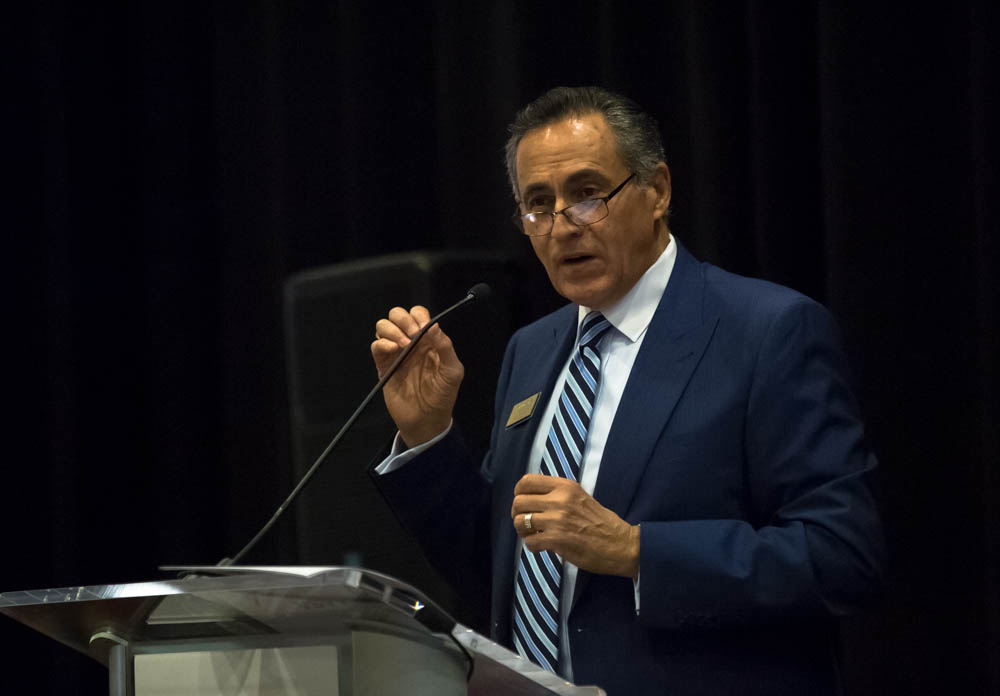AASA Executive Director Dan Domenech touched on the association’s major accomplishments of the past year, with special attention to a new initiative supporting superintendents dealing with crises, during a presentation to the AASA Governing Board on Wednesday morning.
During a 40-minute state-of-the-association address, Domenech touched on the organization’s work in federal legislative advocacy, upgrades in legal support for members, expansion of professional development cohorts and the association’s current financial state among other matters. He delivered his rundown in front of roughly 100 delegates at the J.W. Marriott Hotel in Los Angeles.
“We’re doing so many things, it could take all morning,” he said at the outset. “So instead, I’m focusing on some things we can be especially proud of.”
He reserved his greatest attention to AASA’s startup efforts to support members leading school districts that experienced natural disasters, such as tornadoes and wildfires, or human tragedies, such as school shootings and student deaths from suicide, drug overdose or vehicle accidents.
In 2018, AASA developed a School Safety and Crisis Planning toolkit and set up a 24-hour hotline (571-480-0313) to address immediate needs of superintendents in the aftermath of a crisis. The hotline is staffed by Joe Erardi, a recently retired superintendent and former Governing Board member, who handled the final 10 minutes of Domenech’s presentation.
Noting that the first anniversary of the mass shooting at a high school in Parkland, Fla, would follow on the next day, Erardi said his work on safety and security for AASA was intended to be “pro-active in design,” featuring informational resources and leads to fellow school system leaders willing to be consulted.
To encourage superintendents to be prepared for a crisis in their school communities, Erardi has begun distributing brief monthly messages on such issues as risk assessments and public communication in the aftermath of tragedy.
In Domenech’s preceding remarks about the association’s state, he covered the following, in summary:
- Legal support. The association has raised basic legal support to members from $1,000 to $2,000 and increased lifetime coverage up to $20,000. The expansion in legal coverage cost the organization an additional $94,000, Domenech noted.
- Member engagement. The executive director pointed to AASA’s 34 cohorts involved in professional development or national certification in the superintendency, involving more than 2,000 school leaders during the past year. The escalation of these programs, he said, has turned AASA’s national conference into “a Sunday to Sunday event now” and led to the scheduling of a separate graduation ceremony (on Thursday evening) for those who had completed their 18-month cohort programs.
- Federal advocacy. Calling it “our primary mission,” he lauded the three-member public policy department for conducting 68 meetings with members and state affiliates in 34 states during 2018 and for their spadework with congressional staff in Washington. “”Whenever I go up to The Hill, doors open and faces are smiling and the skies are blue,” Domenech said, describing the staff’s influence.
- Membership recruitment. Domenech referenced the launch of a campaign to recruit more members in rural areas and the association’s legal work to take ownership of the Rural School and Community Trust as a separate entity with its own governing board under the AASA umbrella.
He also pointed to the success of state superintendent associations that had combined collection of annual membership dues for AASA with their own and made it an “opt-out” measure. Seventeen states now use opt-out dues collections with eight adopting the practice in the past year. This tactic has led to significant membership gains for both the state and national organizations in Washington, Pennsylvania, New York and Michigan, he said. - Association finances. Saying the association was in “great financial shape [and] the envy of fellow education organizations,” Domenech advised the Governing Board not to expect a major surplus at year’s end because of the drop in attendance at this year’s conference in Los Angeles compared to the 2018 affair in Nashville, Tenn. The popularity of the latter event led to just short of a $1 million surplus in the last fiscal year. “We’ll have a modest surplus, just not what we’ve been accustomed to,” he said.
(Jay Goldman is editor of AASA’s Conference Daily Online.)


